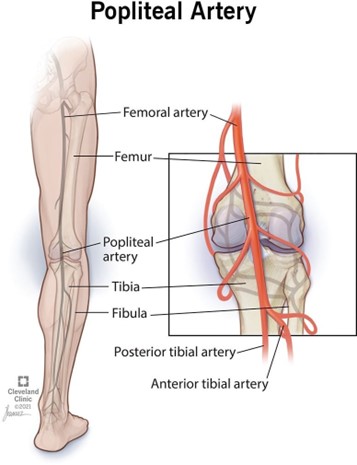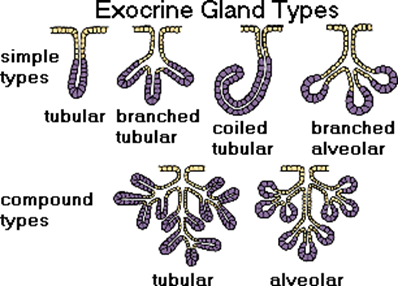Where is the location of the popliteal artery within the body?
Around the thymus.
Around the liver, spleen, and upper gastrointestinal tract.
Behind the knee.
The colon and rectum.
The Correct Answer is C
The popliteal artery is a continuation of the femoral artery that runs through the back of the leg and the knee.

It is located in the popliteal fossa, a hollow space behind the knee. The popliteal pulse can be felt behind the knee.
Choice A is wrong because the thymus is a gland in the chest, not in the leg.
Choice B is wrong because the liver, spleen, and upper gastrointestinal tract are organs in the abdomen, not in the leg.
Choice D is wrong because the colon and rectum are parts of the large intestine, not the leg.
Nursing Test Bank
Naxlex Comprehensive Predictor Exams
Related Questions
Correct Answer is A
Explanation
Excretion is the process of removing metabolic wastes or excrements from the body.
Metabolic wastes are substances left over from metabolic processes (such as cellular respiration) which cannot be used by the organism and must therefore be excreted.
These include nitrogen compounds, water, CO2, phosphates, sulphates, etc.
Choice B. Absorption is wrong because absorption is the process of taking in substances into the body or cells.
It is not related to the removal of waste.
Choice C. Metabolism is wrong because metabolism is the sum of all the chemical reactions that occur in an organism.
It is not a process of removing wastes, but rather producing them.
Choice D. Assimilation is wrong because assimilation is the process of incorporating substances into the body or cells.
It is also not related to the removal of waste.
Normal ranges for metabolic wastes vary depending on the type and concentration of the waste, as well as the organism and its environment.
For example, ammonia is a very toxic waste that requires a lot of water for its excretion, while uric acid is a less toxic waste that can be concentrated into a small volume.
Some normal ranges for human metabolic wastes are:
Urea: 2.5 to 6.4 mmol/L in blood serum Uric acid: 3.4 to 7.2 mg/dL in blood serum Creatinine: 0.6 to 1.2 mg/dL in blood serum CO2: 35 to 45 mmHg in arterial blood gas
Correct Answer is D
Explanation
Exocrine glands secrete through ducts or tubes to the body’s exterior.

For example, sweat glands, salivary glands, and liver are exocrine glands.
Choice A is wrong because exocrine glands do not only secrete salts, but also other substances such as enzymes, mucus, and sebum.
Choice B is wrong because exocrine glands do not secrete hormones at all.
Hormones are secreted by endocrine glands, which are ductless glands that release their products directly into the bloodstream.
Choice C is wrong because exocrine glands do not secrete into the bloodstream, but onto an epithelial surface such as the skin or the gastrointestinal tract.
Only endocrine glands secrete into the bloodstream.
Whether you are a student looking to ace your exams or a practicing nurse seeking to enhance your expertise , our nursing education contents will empower you with the confidence and competence to make a difference in the lives of patients and become a respected leader in the healthcare field.
Visit Naxlex, invest in your future and unlock endless possibilities with our unparalleled nursing education contents today
Report Wrong Answer on the Current Question
Do you disagree with the answer? If yes, what is your expected answer? Explain.
Kindly be descriptive with the issue you are facing.
